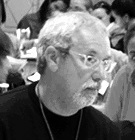We are partnering with LA's BEST, UCLA, and the LA84 Foundation to sponsor a Speaker's Forum on September 28, 2017 entitled, What’s the Evidence: Do After School Programs Make a Difference for Kids? Click here to register.
The How Kids Learn (HKL) Speaker’s Forums are dedicated to providing those who are interested in improving youth outcomes with thought-provoking, educational opportunities. The HKL educational events offer access to national thinkers and researchers, innovative practitioners, and networking opportunities.
This Forum is being organized by Eric Gurna, President and CEO of LA's BEST and features an esteemed panel of speakers. Below, we asked Eric some questions regarding this event.
Q: Why is the topic of this Forum particularly important at this time?
A: When the president's budget director announced drastic proposed cuts to the 21st Century Community Learning Center program as well as other critical supports for families living in economic distress, he said, "There's no demonstrable evidence they're actually helping results." While there has been a great bipartisan outpouring of support for after school since that moment, I think that we as a field need to do better at demonstrating how our programs really do make a difference, for both kids and families. We can't rest on our laurels and rely on years old studies, we need to keep fresh and timely and provide current evidence of the difference we know we are making. Given that the pendulum has (finally) swung back in the arena of high stakes testing, I think now is a great time to measure our progress towards the goals we hold most dear - holistic youth development, community and civic engagement, social skills, emotional growth and intellectual strength and courage.
Q: The Forum will feature a number of presenters. Can you say why you chose these individuals?
A: This panel is like the all-star game of authentic accountability for youth development. Renata Simril is leading the LA84 Foundation into a new era of community leadership. Going far beyond simply funding youth sport, she is playing a leadership role in a region-wide movement to view critical opportunities for youth as social justice. When Renata talks about focusing on accountability in programs, she recognizes that everyone has a role to play in that conversation - service providers, funders, families, policymakers and the young people themselves.
Dr. Pedro Noguera is a nationally recognized expert in youth development and equity. He bridges the gap between the university and the community, and has a critical eye and understanding of quality in youth programs and schools. With his national experience, Pedro helps to broaden this conversation so that in Los Angeles and across California, we can build on the successes of our comrades across the nation.
Moderator Dr. Julia Phelan is a Senior Research Scientist at UCLA CRESST, which has been LA's BEST's evaluation partner for more than two decades. Julia brings deep expertise in evaluation, and will guide the conversation to keep us focused on the question of the day.
Q: Who is the intended audience that you recommend attend this Forum?
A: We are especially eager to invite foundations and others who are involved with funding and supporting youth development programs. There are high expectations for program providers to show evidence of success, but there is little investment in the research and evaluation to develop that evidence, so it's important for funders to engage in this critical dialogue. We are also hoping that program and organizational leaders attend, to learn and contribute.
Q: Will there be an opportunity for attendees to join the discussion?
A: Yes, the idea of this event is that the panel launches the conversation, and the audience then joins in. It wouldn't be after school if we didn't facilitate collective participation!


















